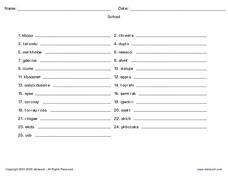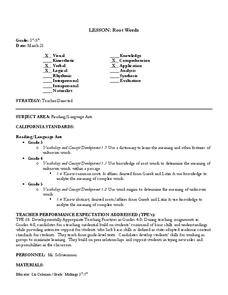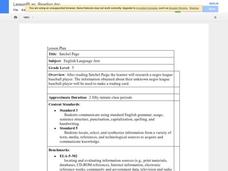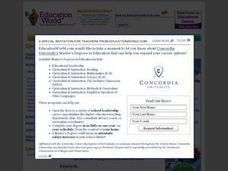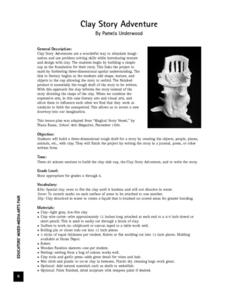Curated OER
Unscramble the Letters
Students develop their spelling skills. In this language arts lesson, students unscramble words and write sentences to accompany each of them.
Curated OER
Comprehension-Note Taking Skills to Supprt Opinions and Panel Discussion
Fifth graders examine note taking skills in order to support opinions. In this language arts instructional activity, 5th graders read several newpaper articles and discuss a current issue. Students explore how to paraphrase so as not to...
Curated OER
Word Family Nuts
Students explore the English language by participating in a word match activity. In this word family instructional activity, students write a specific word family on a paper squirrel and write words that belong to the family on a paper...
Curated OER
"Teaching with Material Objects" - Horn-book
Students explore language arts by creating Venn Diagrams. In this reading materials lesson, students examine a horn-book and create a hypothesis about how to use it and where they derived from. Students compare their horn-book to a text...
Curated OER
Poetry
Fifth graders are introduced to poetry and many authors who create it. In this language arts instructional activity, 5th graders create a class poetry book. Each student submits an original poem, along with an illustration.
Curated OER
Unscramble Words
For this language arts worksheet, students unscramble 25 words. They write the unscrambled words on the blank lines. There are no direction written on the worksheet.
Curated OER
Using the Glossary
Fifth graders explore the glossary. In this language arts lesson, 5th graders define unknown words in a text by using the glossary. Students read a text and use the glossary to find unknown words.
Haut Gap Middle School
Root Words
Scholars demonstrate their knowledge of root words aqua and aud, and develop vocabulary skills by completing of a chart, handout, and worksheet using creative thinking skills, a dictionary, and a thesaurus.
Curated OER
Satchel Page
Bring a instructional activity about Negro League Baseball to your Black history unit, or any other research unit throughout the year. While the lesson plan itself is simplistic, there are several good ideas that you could use, such as...
Curated OER
Using Dictionary Entries
Work on word pronunciations by exploring the dictionary. Learners complete a worksheet containing questions about dictionary entries. They review how to use a dictionary, identify syllable breaks, parts of speech, and word pronunciation.
Curated OER
From A Different Perspective
Emerging writers create a response to their reading. They read Notes from the Trail and discuss whose perspective the journal entry is written from. Then, they write a response to the journal entry in first person perspective as if they...
Curated OER
Degrees Of Meaning
Introduce the idea of a word and its synonyms having different degrees of meaning. Each individual chooses a word that he or she wants to work with and fills out the included worksheet using a thesaurus. Consider having a word bank of...
Curated OER
The Memory Invention
Young writers edit their writing to make sure it shows good meaning and clarity. In this writing lesson plan, students are given a variety of "What If?" scenarios to choose from as writing prompts. A class discussion ensues, which...
Curated OER
Fun With Numbers
Students discover the Lakota Sioux words for numbers. They practice writing number sentences. They share them with the class and complete a worksheet.
Curated OER
Lines Of Connection
We need the help of your history detectives! After giving them a set of questions to answer, reading groups must create their own timeline of the events. Then, as a class, have each group present their timelines. What is different? Why...
Curated OER
It's Raining Cats and Dogs
Make a beeline to this activity. Prepare paper strips with the provided idioms to engage teams in illustrating their literal meanings. The drawings provide the impetus for a guessing game where class members compete to be the first to...
Curated OER
Using the Senses to Write Descriptively
Students write descriptive paragraphs using adjectives based on the use of their five senses. They use sensory impressions to improve their writing.
Curated OER
What Do Writers Do?
Pupils learn about honing their writing through editing. They write the beginning of a story, paying attention to vocabulary and detail. Then they split into groups of two to peer edit. After discussing ways they can improve their...
Curated OER
Meaty Words
Headlines from newspapers launch a discussion of image-rich, meaty words. Just as headline writers choose vivid vocabulary to attract readers, young writers develop headlines that capture the essence of a passage from a book they are...
Curated OER
The Power of Mental Images: Visualizing Literature
Looking for a powerful reading comprehension method? Try visualization! Learners use this strategy to increase comprehension of a chapter book selected by the teacher. As an assessment, individuals or small groups draw pictures of the...
Curated OER
Sentence Combining
After a demonstration by the teacher of how to combine sentences, groups read a story loaded with short, choppy sentences and work together to combine sentences to create a more interesting tale. They record their version on a...
Curated OER
Communication Comparisons
Students investigate various methods of communication. In small groups, they conduct Internet research, compare/contrast three methods of communication, and complete a graphic organizer.
Curated OER
Clay Story Adventure
Students build three-dimensional rough draft for a story by creating objects, people, places, animals, etc., with clay, and write story in a journal, poem, or other written form.
Curated OER
I Spy Poetry
Students identify and interpret the rhythm and form of the I Spy poem.
They then integrate art, music, literature, technology, and writing with poetry. Students also write their own poem based on the picture they printed from the I Spy...







